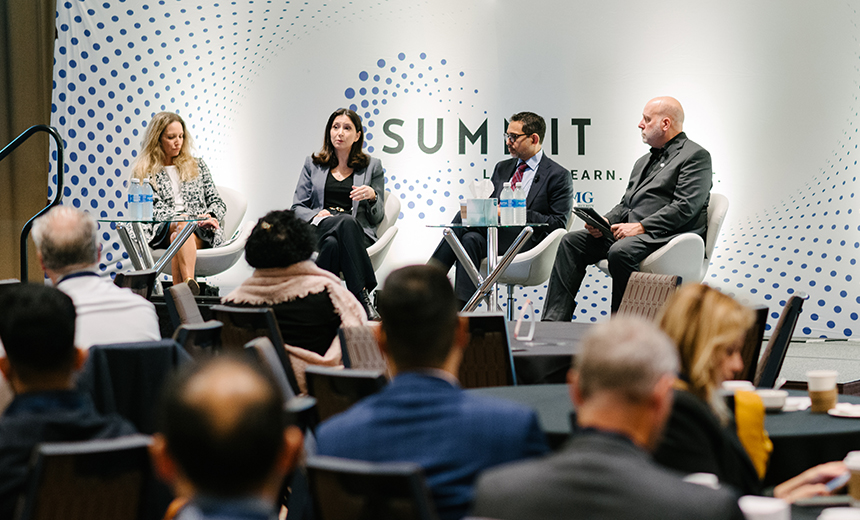From Ransomware to Rising CISO Legal responsibility
[ad_1]
Fraud Management & Cybercrime
,
Geo Focus: Canada
,
Geo-Specific
Canadian Cybersecurity Leaders Brace for Altering Safety Panorama and Laws

At the recent Cybersecurity Summit: Canada East, cybersecurity leaders, industry experts and top executives discussed the surge in ransomware attacks, the integration of AI into security frameworks and growing personal liability concerns for CISOs.
See Also: How Healthcare Can Stay Ahead of Ransomware Attacks
With an emphasis on sensible methods, the Data Safety Media Group summit centered on the challenges and options that cybersecurity leaders must prioritize within the coming years. Ransomware protection was a significant subject.
Ransomware: Classes From Current Assaults
Audio system mentioned the sharp rise in ransomware assaults over the previous yr in Canada and the way CISOs want to arrange for a response. Aniket Bhardwaj, vice chairman of worldwide incident response and cyberthreat operations at Charles River Associates, and CyberEdBoard member; Priya Mouli, head of data safety and compliance at Sheridan School; and Eric Charleston, companion, nationwide co-leader of cybersecurity at Borden Ladner Gervais, mentioned current high-profile ransomware incidents, together with the LockBit assault on London Medicine and breaches affecting Ontario hospitals. These incidents have led to ransom calls for exceeding CA$1 million – a rise of just about 150% within the final two years.
Bhardwaj, Mouli and Charleston advocated for a zero-trust structure and the necessity for worker consciousness and coaching. Organizations ought to undertake a proactive stance by conducting common safety audits and put together incident response plans tailor-made to ransomware eventualities, the panelists stated.
Deepfake Threats and Cyber Deception
In an interactive tabletop train, attendees participated in a simulated deepfake incident concentrating on a company govt. Led by Josh Iroko, managing advisor, Mandiant, Google Cloud; and Carl Montreuil, director, federal policing felony operations – cybercrime, Royal Canadian Mounted Police, this train underscored the rising use of deepfake expertise in cyber deception and monetary fraud. Individuals explored the complexities of figuring out and responding to deepfakes, which have turn into an more and more prevalent software for cybercriminals.
Government Legal responsibility within the Age of Accountability
The growing private legal responsibility for CISOs has made it crucial for safety leaders to know and mitigate their dangers. Robert Knoblauch, former deputy CISO of Scotiabank; and Imran Ahmad, companion/head of Canadian expertise at Norton Rose Fulbright, mentioned the rising scrutiny on safety executives and shared proactive measures that CISOs can take to guard themselves from private legal responsibility, comparable to thorough documentation, well timed breach disclosures and sustaining rigorous safety protocols.
The dialogue drew from high-profile circumstances, together with these in opposition to executives at Uber and TSB, reinforcing the necessity for CISOs to make sure a heightened sense of accountability. Knoblauch and Ahmad introduced consideration to a key message: Leveraging cyber insurance coverage and authorized counsel is essential for shielding safety leaders from potential penalties. .
The summit additionally supplied crucial insights into the regulatory atmosphere in Canada, with Ahmad; Ruth Promislow, companion at Bennett Jones; Deniz Hanley, Canada CISO and head of expertise threat at Morgan Stanley, and CyberEdBoard member, main discussions on the Vital Cyber Methods Safety Act and the Enhancing Digital Safety and Belief Act. These new legal guidelines have launched necessary incident reporting necessities.
“Canada is feeling woefully behind the U.S. with regards to crucial infrastructure safety and cybersecurity laws – they’re enjoying catch-up,” stated Tom Subject, senior vice chairman of editorial at ISMG.
The summit additionally addressed the vulnerabilities current in trendy provide chains. Craig Peppard, CISO at ivari Canada; Fernando Montenegro, senior principal analyst at Omdia; and June Leung, director of identification and entry administration at Mackenzie Investments, shared insights into securing provide chains in opposition to zero-day vulnerabilities. They mentioned the significance of conducting rigorous vendor threat assessments, particularly in gentle of current provide chain breaches such because the MOVEit Switch and Suncor Power incidents. The panelists suggested attendees to implement superior safety controls and steady monitoring techniques to safeguard crucial belongings.
“AI use circumstances are creating. However the good guys aren’t placing gen AI to work almost as shortly or as effectively because the dangerous guys. This can be a severe purple flag,” Subject stated.
Key Takeaways
- AI is remodeling each protection and assault methods, making it crucial for organizations to refine their AI instruments whereas addressing related dangers.
- CISOs face growing private legal responsibility, and adopting authorized safeguards and sustaining proactive documentation are essential to defending themselves and their organizations.
- Compliance with Canada’s new cybersecurity laws is important, and organizations have to be ready to satisfy necessary reporting necessities.
Be part of us at ISMG’s Virtual Government Cybersecurity Summit Oct. 29-30, 2024. Uncover cutting-edge methods and insights from trade specialists to safeguard your group in opposition to evolving cyberthreats.
[ad_2]
Source link

